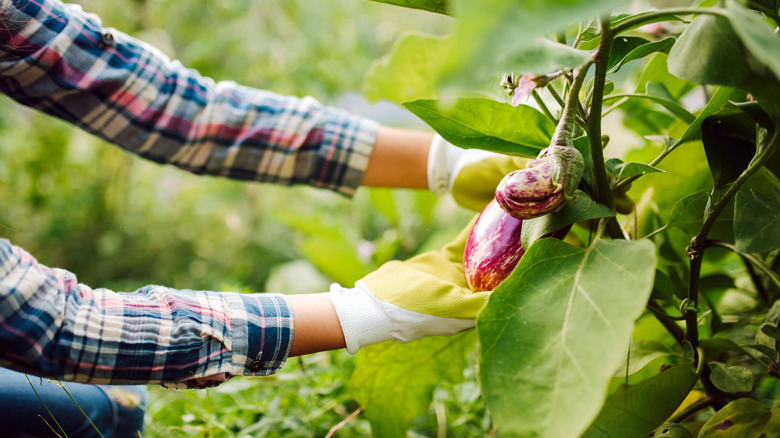Reasons Corn And Eggplants Don't Belong Together In The Garden
When planting crops, thoughtful planning and plant placement can significantly impact your yield and overall garden health. You may think that planting corn and eggplants together is a good idea — they are, after all, warm-season crops that you might enjoy together at a summer barbecue. However, think twice before placing these two neighbors in the same garden bed. Both corn and eggplants need a lot of nutrients, leading to intense competition if planted in close quarters.
The concept of companion planting becomes crucial here. This is the practice of strategically placing plants near one another to benefit each other in some way, be it through nutrient sharing, pest control, or optimal land use. In the case of corn and eggplants, their heavy nutrient requirements mean they are not good companions. Instead of mutually benefiting from each other's presence, they engage in a nutrient tug-of-war. While some plants act as excellent neighbors for eggplants — enhancing their growth or offering some form of pest control — corn, however, isn't among them. Placing these two heavy feeders in the same bed disrupts the balance and synergy you aim to achieve with companion planting, causing more harm than good. By understanding the principles of companion planting, you can maximize your garden's productivity, avoid unnecessary complications, and promote a more harmonious plant community.
The battle for nutrients: corn and eggplants are heavy feeders
The term "heavy feeders" may sound like something you'd hear on a farm when talking about livestock, but it's actually a crucial concept in gardening. This term refers to plants that demand considerable nutrients from the soil to flourish. Both corn and eggplants are in this category, which makes them less than ideal neighbors in a garden setting. If you plant these two heavy feeders together, you essentially set up a nutrient battlefield. Corn, for instance, is notoriously nitrogen-hungry and relies on this vital nutrient for its rapid growth and the development of healthy ears. Eggplants are no different; they also need a significant amount of nitrogen, particularly during their growth stage. So, what's the fallout? Their constant fight for the same limited resources in your garden soil can lead to nutrient deficiencies and, consequently, reduced crop yields.
Given this intense nutrient rivalry between corn and eggplants, you're saddled with extra chores and concerns. Not only do you have to constantly monitor the soil's nutrient levels, but you may also find yourself applying supplemental fertilizers more frequently. This is all to meet the demanding nutrient needs of these two particular crops. The extra steps translate into more work, increased stress, and additional costs, possibly even leading you to question the efficiency of your gardening efforts. Therefore, while corn and eggplants are stellar additions to a garden when paired with suitable companions, putting them together in the same plot invites horticultural headaches and complexities.
The best companions for eggplants
Since corn and eggplants don't make a good pair, you might wonder what other plants could be better companions for your eggplants and corn. Legumes like beans and peas are an excellent choice because they can fix nitrogen in the soil, benefiting nutrient-hungry plants like eggplants and corn. Other good options include aromatic herbs like basil, which not only enhance the flavor of your vegetables but also help deter pests. Be aware that plants in the nightshade family, like tomatoes and peppers, have similar growing requirements to eggplants, but you should be cautious about pest cross-over. Spinach and other leafy greens can also be useful companions, as they grow low to the ground and can help retain moisture in the soil, benefiting both corn and eggplant.
All in all, choosing the right companion plants maximizes space and supports better plant health and yield. Some companions can help deter pests naturally, reducing or even eliminating the need for chemical pesticides. Others can enrich the soil with necessary nutrients, offering a natural, symbiotic relationship that benefits all plants. So, while the combination of corn and eggplants in your garden might be tempting from a culinary point of view, horticulturally, it's a recipe for trouble. Instead, consider each plant's needs and characteristics to find the most compatible companions. By doing so, you'll be creating a more efficient, harmonious, and productive garden.


